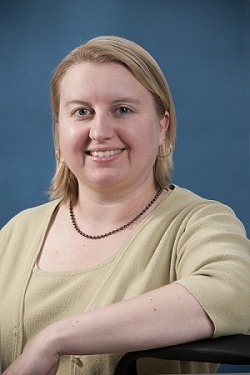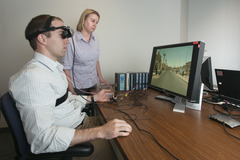
Name Andrea Webb
- Education Ph. D. and M.S., Educational Psychology, B.S., Psychology
- Target Audience High School

Dr. Andrea Webb's work as a Psychophysiologist stands at the crossroads of two sciences, psychology and biology. Psychophysiologists have only recently been named the official examiners of the relationship between mind and body. Read more to find out what Dr. Webb had to share about her innovative field in this exclusive KidsAhead interview.
I am a Psychophysiologist. My job is to look at the body's responses to psychological manipulations such as looking at pictures and listening to sounds. While Psychologists are interested in why we may fear snakes, a Psychophysiologist will attempt to understand our body's response to that fear.
It was definitely an accidental career that turned out to be the best mistake ever! Even though I discovered I really liked physiology in high school, I declared art as my major when I started college if you can believe it. After the first year I realized art was more of a hobby and not what I wanted to pursue as my career. So, I switched majors and graduated from Boise State University with a Psychology degree. My undergraduate mentor introduced me to a colleague who is world renowned in the psychophysiological detection of deception. I was so intrigued with his work around detecting deception that I decided to continue my education at the University of Utah where he became my mentor and the rest is history!
There isn't one! My job includes a lot of different responsibilities which makes every day unique and exciting. My days are filled with designing research studies using psychology, coming up with ideas for future projects and analyzing and interpreting data. I also spend a lot of time writing up results from projects and turning that analysis into papers. Sometimes my papers are published and then I get to present my work at conferences - an incredibly rewarding experience. I think one of the aspects of my job that I enjoy most is mentoring my junior colleagues. I had a really wonderful mentor when I was starting out, so it is important to me to help new scientists navigate the workplace too. Being a Psycophysiologist is definitely not boring or monotonous!
 I feel really fortunate because I genuinely like every aspect of my job. I work with different people on new and interesting projects all the time. I also analyze data from the projects and share my finding with others. What I love about this process is that all data can be manipulated to tell a story, so it's important to complete a critical analysis to help maintain the integrity of the research.
I feel really fortunate because I genuinely like every aspect of my job. I work with different people on new and interesting projects all the time. I also analyze data from the projects and share my finding with others. What I love about this process is that all data can be manipulated to tell a story, so it's important to complete a critical analysis to help maintain the integrity of the research.
I have had an interest in science and math for as long as I can remember. My favorite class in high school was an elective that covered Anatomy and Physiology. This was really my first taste of how the human body works and how all of the systems within our bodies are interconnected.
Freshman year at college I realized that I wanted to do something more than art. I started focusing on art therapy using psychology, but after that first year I ultimately decided to change directions and concentrate exclusively on psychology.
There are challenges for everyone who pursues engineering whether it's hard classes or a theory to understand, but with a good mentor and support system you can definitely overcome those challenges. Having a network of people that I could talk to and bounce ideas off of also helped to make me well-rounded and expand the projects I was working on, which ultimately made them better.
Absolutely! I met my mentor through my undergraduate advisor and I wanted to be just like him when I grew up. Even after graduate school, he has continued to mentor and work with me. There are so many great mentors out there who will be with you throughout your career. Mine has made a big difference in the career path I pursued, and I am grateful for everything he has and continues to teach me.
Find someone who works in the field you're interested in and talk with them. Go to work and shadow them to see what they do or go to lunch and pick their brain about what their job is like. Ask them what they studied and did in school. Keep in mind that school is definitely what you make of it. Remember, you can get a great education at any institution if you're willing to work hard. No matter what school you go to or path you choose, keep in mind that mentorship is critical!
Psychology is a great foundation, as well as statistics, anatomy and physiology. Science classes teach critical thinking skills and the scientific method which can help you to develop strong analytical skills. No matter what major you choose, be sure to take as much math as possible. It will come in handy later!
Science and technology are advancing so quickly it's difficult to tell where we'll be in 5 years, but I think human computer interaction will definitely increase. Also, we will see a lot of advances in devices and sensors that assist with disabilities and disorders.
Fun Facts:
Physiology: The science of living organisms and their parts.
Psychology: The science of behavior.
Biology: The science of life in all its forms and phenomena.
(adapted from dictionary.com)
Who helps deal with people who have heart related diseases? Well that'…
Just how important is food? Imagine how important of a job it must be t…
Pharmacists have a very big job handling medication for patients! They …